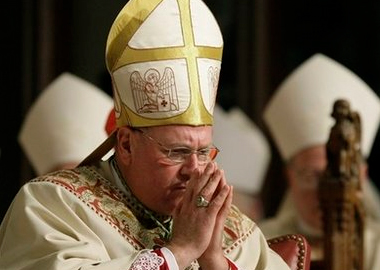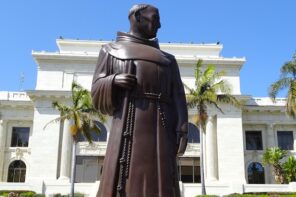It’s funny how things happen. I was thinking about writing a piece on Archbishop Timothy Dolan of New York, and when I got home, there he was all over my inbox, unexpectedly elected the president of the United States Conference of Catholic Bishops (USCCB).
I was thinking about Dolan because last week I got to see him in action for the first time. The archbishop had come down to the historic St. Joseph’s Church in Greenwich Village to lead a vespers service for the local chapter of Pax Christi, the international Catholic peace association on the anniversary of the birth of Dorothy Day, one of the great leaders of the US Catholic peace movement.
Word on the street here is that Dolan is a much nicer man than Cardinal Edward Egan, his predecessor as archbishop of New York. And he certainly did smile a lot at the vespers, and sounded convincing when he thanked Pax Christi for inviting him. What I’ve been mulling over, though, is Archbishop Dolan’s sermon about Day, who, having spent most of her life in New York, often worshiped in the very church where we were singing vespers. And while Dolan said a number of things about Day in his sermon, including a brief mention of her pacifism, what he stressed above all was Dorothy Day’s loyalty to the Church. She was a faithful Catholic. He didn’t use the word obedient, exactly, but clearly that’s what he was getting at.
Now there can be no doubt that Dorothy Day was a faithful Catholic; she did not spend a lot of time attacking the bishops. But she was also nobody’s fool. As the distinguished historian of American Catholicism James Terence Fisher has stressed, Day was shrewd enough to become one of the most influential American Catholics of the twentieth century. And just because she didn’t get into rows with the bishops doesn’t mean she was their lackey. A colleague the other night told of once seeing Dorothy pitch a fit at the editor of her newspaper, The Catholic Worker, because priests had authored three of the articles in the latest issue—clearly more than she was looking for.
This brings us to the election of Archbishop Dolan as president of the USCCB. As previously noted, the archbishop is a cordial and well-spoken man, so I’m sure he was gracious to his defeated opponent, Bishop Gerald Kicanas of Tucson.
But his election is not a good sign. As the New York Times mentions, this is the first time a vice president has not been elected president of the USCCB since the 1960s. What the Times fails to mention is that it happened then because the vice president was quite old and would have retired as bishop in the middle of his term. The rejection of a Bishop Kicanas is essentially unparalleled. As Thomas Reese SJ., the former editor of America has said, the election of Dolan signals the increasing investment of the US Catholic bishops in the culture wars.
And let’s be clear, the bishop who was defeated in this election is no raging liberal. Since John Paul II, there hardly are liberal Catholic bishops, never mind raging ones. Kicanas was a moderate, an opponent of abortion and gay marriage surely, but one who advocates dialogue on these issues, not condemnation. Archbishop Dolan, on the other hand, is a fighter for the orthodoxy that has become central to the Catholic Church since Dorothy Day’s death in 1980—sex and gender.
In recent weeks, the two most influential Catholic magazines in the US, Commonweal, and America, have published articles about major crises currently facing the US Church. In America, Vincent Miller argues that Catholic social teaching on the obligation to care for the poor, as well as the essential role of government in the common good, is under massive attack. In Commonweal, Peter Steinfels zeroes in on the nearly 30 million men and women—a third of all the Catholics in the country—who have left the Church.
Miller says outright that a major cause of the crisis in Catholic social teaching is the bishops’ “reductionist” application of the category of “‘intrinsic evil’… only to abortion, embryonic cell research, and same-sex marriage.” To help stem the massive loss of US Catholics, Steinfels urges the bishops to hold “regular systematic assessments of… controversial matters like expanding the pool of those eligible for ordination and revisiting some aspects of the Church’s teaching on sexuality,” as well as better pastoral practice.
Under Archbishop Dolan, it’s highly unlikely that the bishops will turn their attention to either of these crises. As the Times reports, in the press conference following the election Dolan committed himself to continuing the approach of outgoing president Cardinal George of Chicago who stressed that the bishops are the authorities on interpreting the faith for Catholics. “We’re teachers,” he said, “and not just one set of teachers in the Catholic community, but the teachers.” It’s implied that the rest of us US Catholics, like Dorothy Day, should just be loyal and obey.





